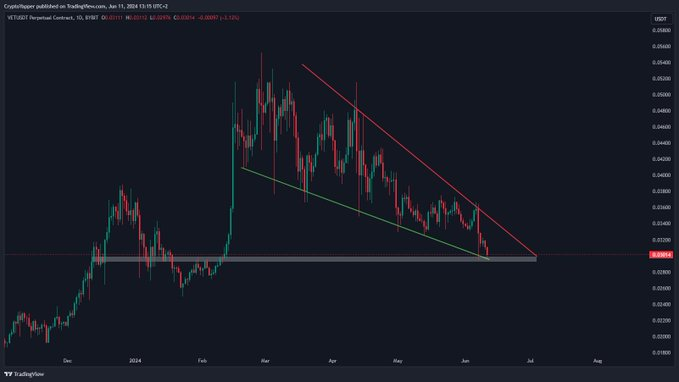VeChain founder Sunny Lu highlighted the staggering environmental impact of single-use paper cups at Proof of Talk. He noted that a massive 16 billion paper cups are discarded each year, requiring the felling of 6.5 million trees.
How many paper cups do we waste every year? 16 billion paper cups from 6.5 million trees 🤯!@sunshinelu24 was at @proofoftalk to explain why incentivizing people to make sustainable choices through VeBetterDAO dApps like @mugshot_vet can save over 3 million trees annually. pic.twitter.com/mgsgzof7Xk
— vechain (@vechainofficial) June 12, 2024
Lu proposed a straightforward solution: If everyone made a conscious effort to avoid using paper cups, for instance by bringing a reusable mug when buying coffee, a significant positive impact could be made. Lu estimates that this could save over 3 million trees annually.
While Lu’s talk focused on environmental sustainability, the VeChain (VET) cryptocurrency community faces its own sustainability concerns, with analysts closely monitoring VET’s price. An X post from Crypto Yapper, stated that VET is testing a critical support level.

Source:CryptoYapper
In other words, the price needs to hold above this level to maintain a positive outlook. If the price falls below, the analyst predicts a steeper decline. The tweet concludes by asking if investors still have faith in VeChain.
While the environmental and financial aspects of VeChain may seem separate, they both highlight the importance of sustainability. Reducing reliance on single-use cups promotes environmental sustainability. Similarly, for VeChain to be a sustainable investment, its price needs to remain stable.
Recently, crypto enthusiast Collin Brown announced on X that VeChain has obtained a patent for carbon trading technology, raising their total number of patents to 67. This new patent involves acquiring ID and carbon data from transportation devices, converting it into carbon emission reduction equivalents through smart contracts and storing the data on a blockchain for trading. The goal of this technology is to make sure that data authenticity and streamline the carbon trading process.
Disclaimer: The information presented in this article is for informational and educational purposes only. The article does not constitute financial advice or advice of any kind. Coin Edition is not responsible for any losses incurred as a result of the utilization of content, products, or services mentioned. Readers are advised to exercise caution before taking any action related to the company.
 coinedition.com
coinedition.com